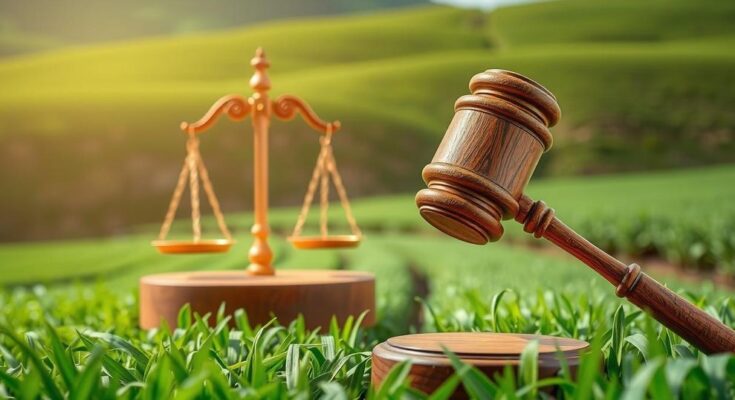A climate lawsuit initiated by Peruvian farmer Saul Luciano Lliuya against German energy giant RWE is set to redefine accountability for climate change. Lliuya argues that RWE’s greenhouse gas emissions have contributed to the melting glaciers threatening his village. The case may have significant implications for future climate litigation and corporate responsibility.
A pivotal climate lawsuit involving Peruvian farmer Saul Luciano Lliuya and German energy company RWE is currently underway in Germany. This case, initiated by Lliuya, posits that RWE’s greenhouse gas emissions have contributed to climate change, exacerbating glacial melting in Huaraz, Peru, and increasing the risk of flooding from Lake Palcacocha. Legal experts contend this lawsuit may set a profound precedent in holding corporations responsible for environmental damage.
Lliuya expressed his concerns about the imminent dangers faced by his community due to environmental changes, emphasizing the importance of glaciers to the local ecosystem. He stated, “The glaciers are melting, are disappearing bit by bit. Some lakes, lakes like Palcacocha — it’s a risk to me, to more than 50,000 people who live in the zone at risk.” His case is vital not only for his community but for setting a legal framework to address corporate accountability in climate crises.
Lead attorney Roda Verheyen highlighted the urgency of the situation, noting that “there is no time to be lost, because the glaciers are melting every day.” Verheyen acknowledged RWE’s significant emissions, framing this lawsuit as a potential launching pad for future climate litigation against major polluters. Conversely, RWE contends that it bears no direct legal liability, asserting that climate change results from a multitude of global contributors.
The German court has engaged in on-site assessments in Peru and is considering multiple expert analyses regarding the potential threats to Lliuya’s home. While no immediate judgment was announced, the deliberations represent a crucial step towards addressing climate accountability in courts, paving the way for future legal actions against other high-emission entities.
This landmark case against RWE, spearheaded by Peruvian farmer Saul Luciano Lliuya, underscores a significant shift in climate accountability, aiming to hold major corporations liable for their environmental impact. As the court proceedings continue, the outcomes may influence similar lawsuits globally and prompt a reevaluation of corporate responsibility in the face of climate change. Ultimately, the dialogue surrounding this case could signify a transformative moment in the relationship between environmental justice and corporate practices, particularly with regard to greenhouse gas emissions.
Original Source: apnews.com




